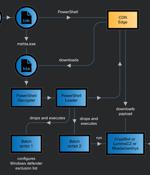Security News

A new ongoing malware campaign has been observed distributing three different stealers, such as CryptBot, LummaC2, and Rhadamanthys hosted on Content Delivery Network (CDN) cache domains since at...

A threat actor has been using a content delivery network cache to store information-stealing malware in an ongoing campaign targeting systems U.S., the U.K., Germany, and Japan. Cisco Talos assesses with moderate confidence that the campaign is a CoralRaider operation, based on similarities in tactics, techniques, and procedures with past attacks attributed to the threat actor.

Microsoft says Windows 10 updates released since the start of the year are breaking Microsoft Connected Cache node discovery on enterprise networks. "After installing the January 2024 non-security update, released January 23, 2024, or later updates, some Windows devices which use the DHCP Option 235 for discovery of Microsoft Connected Cache nodes in their network might be unable to use the MCC nodes," Microsoft explains.

Google is introducing a significant change to Chrome's Back/Forward Cache behavior, allowing web pages to be stored in the cache, even if a webmaster specifies not to store a page in the browser's cache. "Bfcache is an in-memory cache that stores a complete snapshot of a page as the user is navigating away," explains Google's web.

The WordPress plugin WP Fastest Cache is vulnerable to an SQL injection vulnerability that could allow unauthenticated attackers to read the contents of the site's database. WP Fastest Cache is a caching plugin used to speed up page loads, improve visitor experience, and boost the site's ranking on Google search.

Boffins based in Germany and Austria have found a flaw in AMD's SEV trusted execution environment that makes it less than trustworthy. A successful attack - which assumes an attacker is running a malicious hypervisor protected by AMD SEV - could allow arbitrary code execution within a guest VM, the exposure of sensitive data, or privilege escalation.

A team of researchers from UC Irvine and Tsinghua University has developed a new powerful cache poisoning attack named 'MaginotDNS,' that targets Conditional DNS resolvers and can compromise entire TLDs top-level domains. The concept of DNS cache poisoning is injecting forged answers into the DNS resolver cache, causing the server to direct users who enter a domain to incorrect IP addresses, potentially leading them to malicious websites without their knowledge.

Acer has confirmed someone broke into one of its servers after a miscreant put up for sale a 160GB database of what's claimed to be the Taiwanese PC maker's confidential information. "We have recently detected an incident of unauthorized access to one of our document servers for repair technicians," an Acer spokesperson told The Register on Tuesday.

Microsoft says Microsoft Edge users will notice improved performance and a smaller disk footprint because the web browser now automatically compresses disk caches. "Beginning with Microsoft Edge 102 on Windows, Microsoft Edge automatically compresses disk caches on devices that meet eligibility checks, to ensure the compression will be beneficial without degrading performance," the Microsoft Edge Team said Wednesday.

The cache-based targeted de-anonymization attack is a cross-site leak that involves the adversary leveraging a service such as Google Drive, Dropbox, or YouTube to privately share a resource with the target, followed by embedding the shared resource into the attack website. The attack, in a nutshell, aims to unmask the users of a website under the attacker's control by connecting the list of accounts tied to those individuals with their social media accounts or email addresses through a piece of shared content.